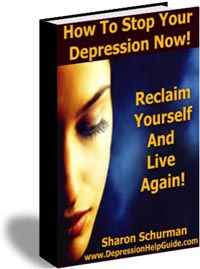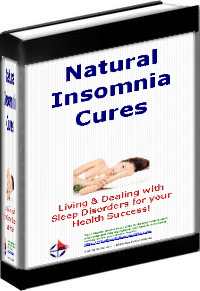What is The Interrelationship of Depression and Insomnia?

 A health article about depression and insomnia from
A health article about depression and insomnia from
Insomnia Cures for sleep disorders using Self Care Strategies
Insomnia is a sleeping disorder characterized by any of the following:
a) light, interrupted sleep that one is still tired upon waking up,
b) not being able to sleep, even if fatigued,
c) lack of sleeping hours.
Insomnia can be classified into three types based on the length of time it affects an individual.
Transient insomnia lasts only a few days and is usually due to changes in living or working conditions, which may be minor or traumatic.
Short-term insomnia, or acute transient insomnia, lasts for less than three weeks and has similar causes as transient insomnia.
Chronic insomnia, on the other hand, is more complex. This condition is characterized by one of the following: a) light, interrupted sleep that one is still tired upon waking up, b) not being able to sleep, even if fatigued, c) lack of sleeping hours.
Based on the causes, chronic insomnia may be considered as primary or secondary:
* Primary chronic insomnia - when the insomnia is not caused by any physical or mental imbalance.
* Secondary chronic insomnia - may be caused by physical and mental conditions, such as depression, or emotional and psychiatric disorders.
Since insomnia is just a symptom of an underlying disease or an imbalance, evaluating the cause of insomnia is very important before prescribing any medication.
Depression is the most common cause of chronic insomnia, especially in the elderly.
A study shows that depressed elderly patients, if they suffer from insomnia, have a tendency to be depressed for over a year.
Another study shows that even without a history of depression, if an elderly patient suffers from insomnia, they have a high risk of being depressed. This is usually observed in women.
It has been proven that insomnia can affect ones' lifestyle negatively. Once this happens, the person starts to worry. Worrying, then causes depression.
Depression is an emotional condition characterized by sadness or misery. Although many have experienced this at one time, clinical depression is a mood disorder characterized by feelings of sadness, anger or frustration affect daily life for an extended period of time.
Another interesting relationship between depression and disrupted sleep is that some medications used for depression can cause insomnia. This is because these medications are used to make the patient more energetic, that at times, these make the patient anxious.
The new anti-depressants that have stimulant effects include Prozac, Paxil, Zoloft and other serotonin-reuptake inhibitors. Serotonin-reuptake inhibitors are substances that prevent the reabsortion of substances in the kidney.
During the biological elimination process of substances taking place in the kidney, some substances are reabsorbed in the kidneys, thus, prolonging the effect of such substances.
With the presence of serotonin-reuptake inhibitors, serotonin is not reabsorbed and is continued to be eliminated from the body.
Serotonin is an important monoamine neurotransmitter that plays a large role in depression, anxiety and bipolar disorders. Some serotonin is converted by the pineal gland, the pea-sized gland at the center of the brain, into melatonin. Melatonin is a hormone that helps regulate the sleeping and waking cycles.
In addition to the prescribed medications to treat insomnia, a patient may also practice the following procedures to combat insomnia.
* Control exposure to caffeine, alcohol and nicotine.
These three substances are known to disrupt one's normal sleeping patterns.
* Maintain regular sleeping time and waking time.
This would help in maintaining the circadian rhythm thus minimizing the effects of fatigue caused y insomnia.
* Regular exercise is good for the body but this shouldn't be done late in the afternoon or early in the evening.
This is because exercise tends to start-up the body. If the body has gained more energy by the end of the day, this can prevent one from being able to sleep at night.
* Go to be only when about to sleep. Reading or watching TV in bed is discouraged or to be avoided.
When the mind is conditioned that the bed is for sleeping, once one goes to bed, he or she can readily get some sleep.
* Eat meals regularly.
Meal intake affects biological activities due to increased blood blow to the stomach.
These pointers may be helpful in managing conditions associated with insomnia. Still, some situations require sleep-promoting medications prescribed by a medical specialist.
 Free Report Reveals "How to Stop Your Depression Now!" Free Report Reveals "How to Stop Your Depression Now!"
Reclaim Yourself and Live Again!
Free Health Book
Download your overcoming depression Special Free Report Today
Click the link above or the book cover to get your free ebook & eCourse today!
|
Diet change strategies:
There are certain foods which improve our sleep. These foods are rich in trytophan. Tryptophan is the amino acid that the body uses to make serotonin, the neurotransmitter that slows down nerve traffic and lulls us into restful sleep. Eating carbohydrates rich in trytophan makes this calming amino acid more available to brain.
Foods containing trytophan that aid sleep are
. Milk
. Cheese
. Curd
. Potato
. Wheat
. Seafood
. Beans
. Sesame seeds
. Oatmeal
. Apricots
. Bananas
Tip: Avoid eating junk food and highly refined food at night because fibre-rich food increases serotonin availability, but processed carbs over stimulates insulin, which leads to disturbed sleep.
Other Bed time snacks can include:
. Whole grain cereal with milk
. Ice-cream
. Sesame seeds
. Oatmeal or raisin cookies
Tip: Lighter meals are more likely to give you a good night's sleep.
So that old-fashioned glass of warm milk or cocoa before bed seems to have a foundation in fact!
Vitamin & Nutrient Associations
‘Studies have shown a link between Vitamin B12 and other health conditions including insomnia. The body requires vitamin B12 to manufacture red blood cells and myelin. Myelin is the fatty lining around nerve cells. There has been a great deal of research into the effectiveness of vitamin B12 injections and multiple sclerosis.
Vitamin B12 is a part of the natural diet of most of the Western countries, with the exceptions of Vegans. The vitamin is found in significant amounts in animal protein-foods including meat, poultry, eggs, fish and dairy products. The small amounts of vitamin B12 present in these different foods are more than enough to provide a supply for a healthy diet.
Vegans, on the other hand, especially strict Vegans who do not allow any of these Vitamin B12 source foods into their diets, will eventually develop a dietary deficiency. The deficiency usually takes years to develop and B12 supplements can stave off that effect.
Vitamin B12 acts along with folic acid and vitamin b6 to control different levels in the body. A deficiency can cause fatigue, whereas those who are not deficient may feel a significant energy boost upon taking additional B12.
Vitamin B12 injections have been used to treat sufferers of Chronic Fatigue Syndrome. Injections of 2,500 to 5,000 milligrams every two to three days has shown a significant improvement in the energy levels of those suffering from CFS. B12 deficiencies are not common and they are usually related to diet or malapsorption through the intestines. Both of which are treatable with dietary adjustments.
Doctor's recommend that vitamin supplements be used as a regular part of a healthy diet. Vitamin supplements whether including the B12 complex or otherwise, should not be used as the replacement for a healthy diet unless there is a total absence of the vitamin such as found in Vegan's dietary concerns.
Further reading through our articles on health issues will give you a body of information that will help you decide what options you have to deal with the underlying causes of your jet lag sleep disorders problem through giving your body the nutrition products that will assist you body to heal from the inside out.
You may find benefit from our information on detoxification
As well as about detoxing because of change of diet
It may be due to difficulties with your digestive system that is causing your body to be starved of key nutrients, vitamins or minerals. In this case you may find useful answers by reviewing our article on Nutrition For Your Cells.
There is also more information here about why is nutrition such an issue nowadays?
It may be that your metabolism has slowed due to pressures that have been placed on your system through life in general or through specific “challenges” you have faced in the last few months or last few years. Review this by looking at our article about balancing your Metabolic Rate. We wish you well in your search for solutions to this problem and your movement towards better health in all areas.
More Resources available about child sleep disorders :
sleep disorders
Good quality sleep is a habit. If you make the changes above, don’t expect changes in your sleep pattern to occur overnight, give it time. And be forgiving of yourself. Nothing prevents a good nights sleep more than the increased sense of annoyance at not being able to go to sleep. So quit trying, get up and do something relaxing.
daily sleep requirements
It’s a basic necessity of life, as important to our health and well-being as air, food and water.
When we sleep well, we wake up feeling refreshed, alert and ready to face daily challenges.
When we don’t meet our daily sleep requirements, every part of our lives can suffer.
Our jobs, relationships, productivity, health and safety (and that of those around us) are all put at risk.
Energy Quiz
In general, there are three levels of energy level, hyperthymic, even balanced and hypothymic. To figure out in which energy do you fall in, answer the following questions.
(To read the rest of this article click on the Title above here.)
Restless Leg Syndrome
Restless legs syndrome (RLS) or Ekbom’s syndrome is a misunderstood common condition which causes the legs and sometimes the arms to twitch just before going to sleep; this can cause problems with insomnia Around one in twenty people suffer from restless legs syndrome (RLS) during their life, it tends to affect women more than men especially pregnant women and middle aged women, other groups that tend to suffer from restless legs syndrome (RLS) are those suffering from kidney disease, nerve diseases, rheumatoid arthritis and varicose veins
 Free Report Reveals Natural Insomnia Cures: Free Report Reveals Natural Insomnia Cures:
Living & Dealing with Sleep Disorders for your Health Success!
Free Health Book.
This report reveals the most common sleep disorders like sleep apnea, snoring, its affects on individuals and the remedies.
Click the link above or book cover to get your free Report & eCourse today!
|
Natural Sleep Aids & better sleep Tips
Free simple sleep aid recipes, therapies and how-to instructions for better sleep using massage, aromatherapy, oils, herbs, baths, comfort drinks, dream meanings, healthy sleep routines.... AND MORE.
www.sleep-aid-tips.com
Jet lag sleep disorder
One common problem with jet lag is that, for many people, the true effects of jet lag are not immediately apparent and it may take a day or two to "catch up" with you. In addition, the excitement of arriving at your holiday destination, or for an important business meeting, may also tend to mask the symptoms of jet lag. So, if you arrive at your destination feeling like a million dollars and throw yourself into your holiday or business activities - beware! Jet lag will almost certainly creep up and hit you on the back of the head just when you least expect it.
snoring
Statistics show that about 45% of adult’s snores from time to time while around 25% snores regularly. This is mostly considered as a problem that needs some intervention or treatment.
Generally, snoring is most common in men than women. Overweight people show more tendencies to snore than those within normal weight. Age appears to aggravate the situation as well.
sleep apnea
Sleep apnea, sleep apnoea or sleep apnœa is a sleep disorder characterized by pauses in breathing during sleep. These episodes, called apneas (literally, "without breath"), each last long enough so one or more breaths are missed, and occur repeatedly throughout sleep. The standard definition of any apneic event includes a minimum 10 second interval between breaths, with either a neurological arousal (3-second or greater shift in EEG frequency, measured at C3, C4, O1, or O2), or a blood oxygen desaturation of 3-4 percent or greater, or both arousal and desaturation. Sleep apnea is diagnosed with an overnight sleep test called a polysomnogram.
We also feature new health articles & self care solutions every month in “Your Health Success” our FREE Health Magazine, so subscribe today to stay up-to-date!

to “Your Health Success”
our monthly F’R’E’E’ Newsletter
Back to Top of depression and insomnia page
Subscribe to “Your Health Success” newsletter
Terms of Use |
Privacy Policy |
Disclaimer |
Site Map

============================================================================
SITE DISCLAIMER: Do these products “cure” anything? Of course not… but it stands to reason that if you cleanse your body and feed it the finest nutrition available, giving it everything it needs in balance, on a daily basis, that your body will do what nature intended, and give you the best possible chance to fend off sickness and disease. This depression and insomnia information is not presented by a medical practitioner and is for educational and informational purposes only. The depression and insomnia content is not intended to be a substitute for professional medical advice, diagnosis, or treatment. Always seek the advice of your physician or other qualified health provider with any depression and insomnia questions you may have regarding a medical condition. Never disregard professional medical advice or delay in seeking it because of something you have read.
The depression and insomnia resources on this site are not intended to be a substitute for professional advice. While all attempts have been made to verify depression and insomnia information provided in this publication, neither the author nor the publisher assumes any responsibility for errors, omissions or contrary interpretation of the web site depression and insomnia subject matter herein. The site depression and insomnia contents are solely the opinion of the authors and should not be considered as a form of advice, direction and/or recommendation of any kind. If expert advice or counseling is needed, services of a competent professional should be sought. The author and the Publisher assume no responsibility or liability and specifically disclaim any warranty, express or implied for any depression and insomnia products or services mentioned, or any techniques or depression and insomnia practices described.
The purchaser or reader of thi depression and insomnia s publication assumes responsibility for the use of these materials and information. Neither the author nor the Publisher assumes any responsibility or liability whatsoever on the behalf of any purchaser or reader of these depression and insomnia materials. There is no guarantee of validity of accuracy. Any perceived slight of specific people or organizations is unintentional. This website and its creators are not responsible for the content of any sites linked to. Since natural and/or dietary supplements are not FDA approved they must be accompanied by a two-part disclaimer on the product label: that the statement has not been evaluated by FDA and that the product is not intended to "diagnose, treat, cure or prevent any disease."
============================================================================
Back to Top of page




